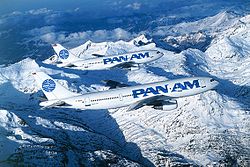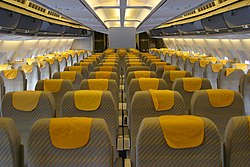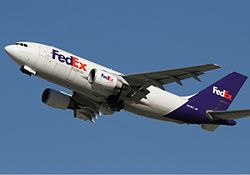Airbus A310
The Airbus A310 is a jet airliner made by Airbus. It was announced in July 1978 and it was the second aircraft to be made by Airbus. The A310 is a shorter version of the Airbus A300, which was Airbus' first plane.
| A310 | |
|---|---|
| Role | Wide-body jet airliner |
| National origin | Many |
| Manufacturer | Airbus |
| First flight | 3 April 1982 |
| Introduction | April 1983 with Swissair |
| Status | Out of production, in service |
| Primary users | FedEx Express Pakistan International Air Transat Mahan Air |
| Produced | 1983–1998 |
| Number built | 255[1] |
| Developed from | Airbus A300 |
| Variants | A310 MRTT CC-150 Polaris |
History
Background
When the Airbus A300 was being designed, Airbus studied many different sizes of plane. The Airbus A300B was chosen, and it was one of the smaller designs. When the A300B prototypes were made, many airlines asked for a plane which could hold more passengers. Airbus then changed to the A300B2 version, which was the first type to be made. Airbus noticed that many airlines also wanted smaller planes. Some airlines did not have enough passengers to use the A300.[2]
Airbus wanted to keep the cost of designing a smaller A300 as low as possible. Airbus decided that the plane would hold 220 passengers, which was what many airlines wanted.
Another problem was the rate of inflation. In the UK during 1979–1980, it was 35%. This would mean that the designing costs would be very high, and so would the price of the plane.[3]
Design effort
From late 1977, BAe began designing the wing for the A310 at Hatfield.
At the April 1978 Hanover Air Show, Airbus brought a model A310. Its wing area was 219.25 m2 (2,360.0 sq ft), was a bit larger than what Airbus designed. If two classes were used in the plane, 195 passengers could travel in the aircraft. If the plane is all-economy, 245 passengers could fit inside.[4]
On 15 March, Swissair bought the A310. It said that it would buy 10 and have 10 options, to replace its McDonnell Douglas DC-9 series. Lufthansa bought ten planes for $240 million. Air France and Iberia soon did the same.[4] On 1 April 1979 Lufthansa increased its order to 25 orders and 25 options. Two days later, KLM bought 10 planes and had 10 options, which cost ₤238 million.[4][5][6] Other airlines which bought the A310 during 1979 included Martinair, Sabena and Air Afrique.[5][6]
At first, Airbus planned two versions of the A310: the A310-100 and the A310-200. The A310-100 could fly for 2,000 nmi (3,700 km) with 200 passengers, and the -200 could carry the same number of passengers for 1,000 nmi (1,900 km) longer.[7]
Making

Airlines kept buying the A310, and the A310-200 flew for the first time on 3 April 1982. Orders and options had been made for 181 aircraft, which was a much better start than the A300. Airbus realised that the −200 aircraft was much more popular than the -100 aircraft. In 1979, Airbus decided to stop making the A310-100.[5]
No airlines bought the A310 during the late 1990s because Airbus had made the Airbus A330. Airbus stopped making the A300 and the A310 in July 2007. The freighter version of the A310 was replaced by the A330-200F.[8]
The A310 was replaced by the A330-200. Between 1983 and 1998, 255 A310s were made.[1]
The A300 and A310 helped Airbus compete with Boeing.
Design
The A310 was a changed version of the A300; the aircraft was first called the A300B10. The main differences between the A300 and the A310 are:
- Shorter
- Back of the plane had its design changed
- Wings were re-designed
- Re-designed wheels with carbon brakes
- Better auxiliary power unit.[9]
Flight deck
The aircraft has a glass cockpit. The A300-600 has the same flight deck as the A310. The flight deck can hold up to two more seats.
Different types of Airbus A310





Two versions of the A310 were made: the −200 and the −300. The first version which was designed was the −200.
- A310-200
- The first A310 first flew on 3 April 1982. It had Pratt & Whitney JT9D-7R4D1 engines. The −200 was used by Swissair and Lufthansa.
- A310-200C
- This version can be changed from a passenger plane to a cargo plane and back again.
- A310-200F / -300F
- Freighter. It can carry 39t of freight for 5,950 km.[11] No A310 freighters were made. All freighter versions of the A310 are changed versions of normal A310s.
- A310-300
- Identical to the −200, but it can fly for longer. Swissair was the first airline to use the plane in 1986.
- A310-300C
- Same as the A310-200C, but it is a version of the -300 and not the -200.
- A310 MRT/MRTT
- The A310 has been used by many air forces as a transport plane (A310-300 MRT). However, several have been changed to the "Multi Role Tanker Transport" design by EADS. The plane can refuel other planes while flying. At least six have been bought.
Users
Military users
The militaries of these countries use the A310.
- Belgian Air Component
- Egyptian Air Force
- German Air Force
- Mongolian Air Force
- Royal Jordanian Air Force (used the A310 in the past)
- Spanish Air Force
- Royal Thai Air Force
Deliveries
When Airbus stopped making A310s, 255 had been ordered and delivered.
| Total | 1998 | 1997 | 1996 | 1995 | 1994 | 1993 | 1992 | 1991 | 1990 | 1989 | 1988 | 1987 | 1986 | 1985 | 1984 | 1983 | |
|---|---|---|---|---|---|---|---|---|---|---|---|---|---|---|---|---|---|
| Deliveries | 255 | 1 | 2 | 2 | 2 | 2 | 22 | 24 | 19 | 18 | 23 | 28 | 21 | 19 | 26 | 29 | 17 |
Data until the end of December 1998.[1]
Accidents
The A310 has had ten hull-loss accidents. 825 people have died in these accidents.[12] A hull-loss accident is when a plane is damaged so much that it cannot be repaired, or if the plane is completely destroyed.
The A310 has also had ten hijackings. Five people have died in these.
Details

| [13] | A310-200 | A310-200F | A310-300 | A310-300F |
|---|---|---|---|---|
| Crew | Two | |||
| Length | 46.66 metres (153 ft 1 in) | |||
| Height | 15.8 metres (51 ft 10 in) | |||
| Wingspan | 43.9 metres (144 ft) | |||
| Wing area | 219 square metres (2,360 sq ft) | |||
| Capacity | 218 passengers (3-class) 240 passengers (2-class) 280 passengers (1-class) |
33t cargo | 218 passengers (3-class) 240 passengers (2-class) 280 passengers (1-class) |
33t cargo |
| Cruise speed (M) | 0.80 (850 km/h.) | |||
| Max speed (M) | 0.84 (901 km/h.) | |||
| Ceiling (the plane cannot fly higher than this) | 12,500 m (41,000 ft) | |||
| Engines | PWJT9D-7R4 or CF6-80C2A2 | PW4156A or CF6-80C2A8 | ||
| Range (when full) |
6,800 km (3,670 nm) Transcontinental |
5,550 kilometres (3,000 nmi) | 9,600 km (5,200 nm) Trans-atlantic |
7,330 kilometres (3,960 nmi) |
Airbus A310 Media
The A310 (background) is a shrunken version of the Airbus A300 (foreground)
In 1988, an A310 was delivered to Interflug: the first Airbus for an Eastern-bloc airline.
FedEx Express A310-200F without wingtip fences
Air Transat A310-300 with wingtip fences
Airbus A310 MRTT of the German Air Force
Related pages
- Aircraft related to this one
- Similar aircraft
References
- ↑ 1.0 1.1 1.2 "Airbus - Historical Orders and Deliveries". Airbus S.A.S. January 2007. Archived from the original (Microsoft Excel) on 2007-02-07. Retrieved 10 December 2012.
- ↑ Gunston 2009, p. 85
- ↑ Gunston 2009, p. 86
- ↑ 4.0 4.1 4.2 Gunston 2009, p. 89
- ↑ 5.0 5.1 5.2 Flight International 27 Oct 1979 edition
- ↑ 6.0 6.1 Airclaims Jet Programs 1995
- ↑ Gunston 2009, p. 91
- ↑ "Airbus aims to fill freighter void with A330 derivative."[dead link] Flight International, 14 March 2006
- ↑ "A310 Europe builds on Airbus success." Flight International, 27 February 1982
- ↑ "Airbus A310." militaryaircraft.de, 12 November 2010
- ↑ "A310-200F Freight version." Aerospace Technology. Retrieved: 6 November 2011
- ↑ "Airbus A310 hull-loss incidents." Archived 2012-10-26 at the Wayback Machine Aviation Safety Net. Retrieved 6 November 2011
- ↑ "Aircraft Family – A310 Specifications." Archived 2009-09-03 at the Wayback Machine airbus.com. Retrieved: 6 November 2011
- Bibliography
- Gunston, Bill (2009). Airbus: The Complete Story. Sparkford, Yeovil, Somerset, UK: Haynes Publishing, 2009. ISBN 978-1-84425-585-6.
- Norris, Guy and Mark Wagner (1999). Airbus. St. Paul, Minnesota: MBI Publishing, 1999. ISBN 0-7603-0677-X.
Other websites
| Wikimedia Commons has media related to Lua error in Module:Commons_link at line 62: attempt to index field 'wikibase' (a nil value).. |
- Airbus A310 – Images, dimensions and full details
- Production list Archived 2007-05-02 at the Wayback Machine
- Official website Archived 2006-01-30 at the Wayback Machine















